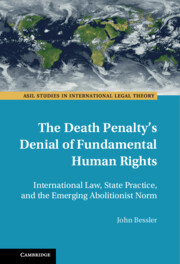 The Death Penalty's Denial of Fundamental Human Rights
The Death Penalty's Denial of Fundamental Human Rights Book contents
- The Death Penalty’s Denial of Fundamental Human Rights
- ASIL Studies in International Legal Theory
- Frontispiece
- The Death Penalty’s Denial of Fundamental Human Rights
- Copyright page
- Dedication
- Epigraph
- Contents
- Preface
- Acknowledgments
- Introduction
- 1 The Death Penalty
- 2 The Abolitionist Movement
- 3 Death Threats and the Law of Torture
- 4 Human Dignity and the Law’s Evolution
- Conclusion
- Bibliography
- Index
Conclusion
Published online by Cambridge University Press: 01 December 2022
- The Death Penalty’s Denial of Fundamental Human Rights
- ASIL Studies in International Legal Theory
- Frontispiece
- The Death Penalty’s Denial of Fundamental Human Rights
- Copyright page
- Dedication
- Epigraph
- Contents
- Preface
- Acknowledgments
- Introduction
- 1 The Death Penalty
- 2 The Abolitionist Movement
- 3 Death Threats and the Law of Torture
- 4 Human Dignity and the Law’s Evolution
- Conclusion
- Bibliography
- Index
Summary
The Conclusion summarizes the book's major themes and arguments, concluding that the death penalty has the immutable characteristics and indicia of torture. The Conclusion asserts that capital punishment violates fundamental human rights, including the right to be free from torture. Non-lethal corporal punishments and mock executions have already been prohibited by law, and the Conclusion asserts that capital punishment should be barred by an existing jus cogens norm--the peremptory norm of international law absolutely prohibiting torture--to stigmatize the practice of capital punishment as a torturous one that has no place in the twenty-first century or in law.
Keywords
- Type
- Chapter
- Information
- The Death Penalty's Denial of Fundamental Human RightsInternational Law, State Practice, and the Emerging Abolitionist Norm, pp. 264 - 291Publisher: Cambridge University PressPrint publication year: 2022
